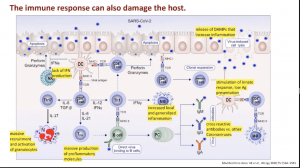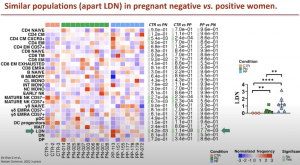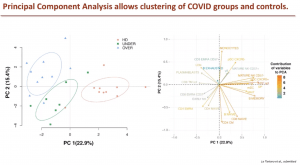Today’s IUIS-Immunopaedia-Frontiers Webinar highlight is on a talk by Professor Andrea Cossarizza (Director of the School of Specialization in Clinical Pathology and Clinical Biochemistry and Vice Dean of the School of Medicine at the University of Modena and Reggio Emilia). Prof Cossarizza webinar focused on “Immunopathology of COVID-19 lessons from pregnancy and ageing.”
 Professor Cossarizza began his talk by highlighting the major role inflammation (and hyper inflammation) play in COVID-19 pathogenesis. He also briefly described inflammatory immune responses that occur in the lung during the late stages of COVID-19 and how immune cell functions aimed at reducing SARS-CoV-2 burden can contribute to further inflammation and have detrimental effects (host cell damage).
Professor Cossarizza began his talk by highlighting the major role inflammation (and hyper inflammation) play in COVID-19 pathogenesis. He also briefly described inflammatory immune responses that occur in the lung during the late stages of COVID-19 and how immune cell functions aimed at reducing SARS-CoV-2 burden can contribute to further inflammation and have detrimental effects (host cell damage).
 Pregnancy and ageing are associated with skewing of immune responses towards pro-Th2 immune responses and inflammageing (pro-th1 inflammation), respectively. Using mass cytometry his research group characterised T and B cell phenotypes in pregnant women with o SARS-Cov-2 infection and (asymptomatic or paucisymptomatic) COVID-19. Interestingly, majority of immune responses between SARS-CoV-2 infected and uninfected pregnant women were not different with exception of higher frequencies of low-density neutrophils in COVID-19+ pregnant women. Analysis of serum cytokine and chemokine levels illustrated increased levels of inflammatory antagonists in COVD-19+ pregnant women compared to uninfected pregnant women (see figure). Additionally, none of the SARS-CoV-2 infected pregnant women experienced complications associated with infection, thus suggesting that if COVId-19 remains asymptomatic and mild, it may have no risk to pregnancy.
Pregnancy and ageing are associated with skewing of immune responses towards pro-Th2 immune responses and inflammageing (pro-th1 inflammation), respectively. Using mass cytometry his research group characterised T and B cell phenotypes in pregnant women with o SARS-Cov-2 infection and (asymptomatic or paucisymptomatic) COVID-19. Interestingly, majority of immune responses between SARS-CoV-2 infected and uninfected pregnant women were not different with exception of higher frequencies of low-density neutrophils in COVID-19+ pregnant women. Analysis of serum cytokine and chemokine levels illustrated increased levels of inflammatory antagonists in COVD-19+ pregnant women compared to uninfected pregnant women (see figure). Additionally, none of the SARS-CoV-2 infected pregnant women experienced complications associated with infection, thus suggesting that if COVId-19 remains asymptomatic and mild, it may have no risk to pregnancy.
 Characterisation of immune responses in aged individuals (<60 vs >70 years old) with COVID-19 illustrated lower levels of central memory CD4+ T, naïve CD8+ T and B cell memory cells, and higher levels of plasmablasts in > 70-year-olds compared with < 60-year-olds. Additionally, they observed differences in cytokine and chemokine levels between the two age groups which were characteristic of increased inflammation in > 70-year-olds compared with < 60-year-olds. Thus, suggesting that inflammaging likely potentiates COVID-19 associated inflammation resulting in further damage to tissues and organs.
Characterisation of immune responses in aged individuals (<60 vs >70 years old) with COVID-19 illustrated lower levels of central memory CD4+ T, naïve CD8+ T and B cell memory cells, and higher levels of plasmablasts in > 70-year-olds compared with < 60-year-olds. Additionally, they observed differences in cytokine and chemokine levels between the two age groups which were characteristic of increased inflammation in > 70-year-olds compared with < 60-year-olds. Thus, suggesting that inflammaging likely potentiates COVID-19 associated inflammation resulting in further damage to tissues and organs.
Summary by Cheleka AM Mpande










